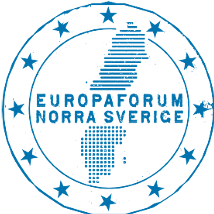Europaforum northern Sweden (EFNS) is a network for politicians at the local and regional levels from Norrbotten, Västerbotten, Jämtland Härjedalen and Västernorrland. EFNS is a meeting place and a knowledge arena for discussion and analysis of the impacts of EU policy on northern Sweden. EFNS monitors European issues to influence EU legislation, the EU’s strategies and action programmes and the EU’s budget. The objective of EFNS is to safeguard the interests of northern Sweden both in the European arena and in relation to the national level in matters with a clear European perspective.
For more than 20 years, EFNS has gathered experience for an effective growth policy adapted to northern Sweden’s specific conditions. The global market mechanisms affecting Europe’s regions become clear in sparsely populated regions, but particularly noticeable in northern Europe’s extremely sparsely populated areas. Most political initiatives taken to equalise the gap between centre and periphery become compensatory, and eventually consolidate the existing differences between urban and rural areas. Europaforum Northern Sweden’s established experience is that efforts designed with a compensatory starting point are blunt and relatively expensive. Europaforum Northern Sweden would like to invite the European Union to the knowledge arena for method development of regional policy initiatives that Northern Sweden may constitute.
EFNS proposes that the method development should be based on the following:
- Promote a testing environment for tailor-made policy applications in line with OECD analyses and recommendations.
- Design and apply more place-based policies for economic growth, education, skills supply and innovation
- Strengthen the link between urban and rural areas
- Invest in digital and transport infrastructure
- Manage territorial market failures
- Support entrepreneurship and innovation capacity in sparsely populated area
- Utilise the potential for green transition
Northern Sweden’s regions may constitute a test environment for innovative regional policy measures with a focus on enhanced attractiveness for research and entrepreneurship. In the light of EFNS’ experience and the knowledge that EFNS has built up with the support of OECD’s analyses and recommendations, it is possible to develop the application of innovative regional policy tools.
Northern Sweden has specific challenges that make the regions vulnerable, such as large distances, sparse and aging population, inadequate critical mass, cold climate, and cyclical sensitive and natural resource-based economy. Northern Europe is characterised by extreme sparseness and scattered small communities, which at the same time are regional growth engines for its surroundings. This is particularly clear in the OECD study of NSPA
2017, OECD Regional Outlook 2016, and the latest OECD study: Rural Well-Being: Geography of Opportunities.
Therefore, the Europaforum Northern Sweden wants to invite the EU to the knowledge arena for method development of regional policy initiatives that Northern Sweden may constitute. The peripheral challenges with skill supply, capital supply and the attractiveness of young people can be met by developing simple and cost-effective efforts. What is required is adaptation of applications within different policy areas, with the differentiation between large and small labour markets required by the different conditions. This invitation to research and growth policy development is based on the analyses carried out by the OECD through the NORA study (2011), which were confirmed and extended in the Territorial Review of the Northern Sparsely Populated Regions (NSPA study (2017).
A crucial step in this method development has been initiated by the Commission through the initiative HEINNOVATE (higher education innovate) that the OECD is currently implementing in dialogue with Member States, regions and educational institutions. The analysis work is based on understanding and proposing changes in the supply-driven education sector, where great variations in accessibility to higher education will have an effect. It also puts at risk Europe’s green and digital transition as education is offered in urban environments while much of the transition is made possible in sparsely populated areas.
A challenge is the supply of capital for sectors, except those directly linked to the industrial base of natural resources, affected by market mechanisms that make the financial market’s assessment of corporate and private individuals’ assets and collateral lower than in densely populated regions.
By developing regional policy methods and instruments, the inhibitory effect that companies experience, depending on their location on a peripheral small labour market, can be overcome. The establishment of regional policy tools with this focus has the potential to revitalise Europe’s small labour markets. The effect can be that the single market is developed and streamlined.
Adopted by Europaforum Northern Sweden on 3 June 2021
Glenn Nordlund (S) Chairman EFNS Region Västernorrland
Åsa Ågren Wikström (M) Deputy Chairman EFNS Region Västerbotten
Jonny Lundin (C) Region Västernorrland
Erik Lövgren (S) Västernorrland Association of Local Authorities
Rickard Carstedt (S) Region Västerbotten
Ann Åström (S) Region Västerbotten
Nils-Olof Lindfors (C) Region Norrbotten
Britta Flinkfeldt (S) Norrbotten Municipalities
Anders Josefsson (M) Norrbotten Municipalities
Elise Ryder Wikén (M) Region Jämtland Härjedalen
Robert Uitto (S) Region Jämtland Härjedalen
Jonas Andersson (S) Municipalities in Jämtland County
Daniel Danielsson (C) Municipalities in Jämtland County
http://euefns-position-eu-growth-creating-efforts-in-small-labour-markets-en-2021-06-03-final.pdf
